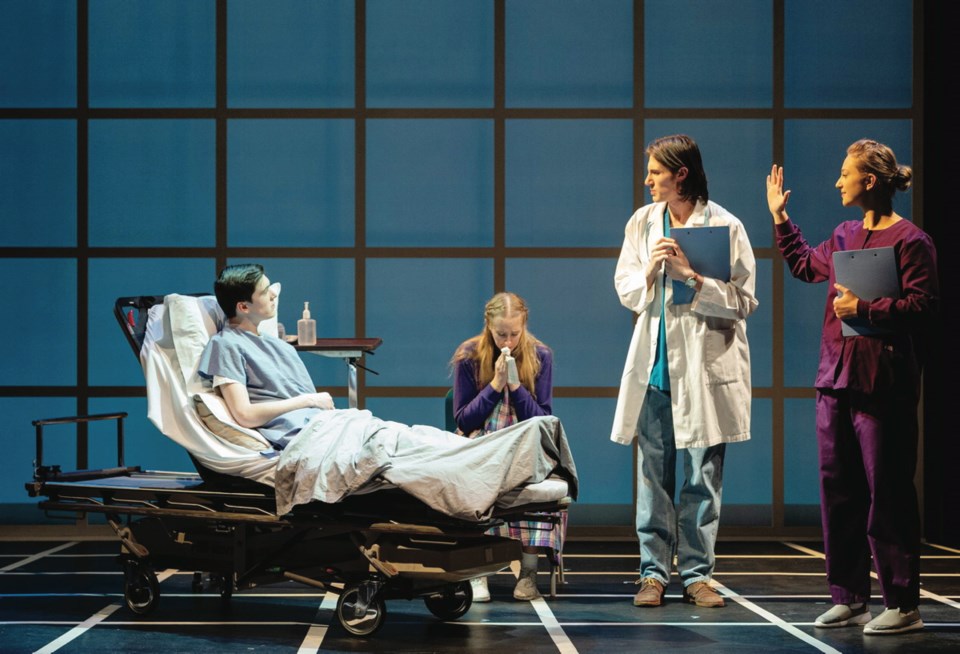ON STAGE
What: Comic Potential
Where: Phoenix Theatre at the University of Victoria, 3800 Finnerty Rd.
When: Feb. 13 through Feb. 22
Tickets: $15-$28 from the Phoenix Theatre box office or 250-721-8000
Humankind is not dependent upon the restaurant recommendations and weather reports we receive when we ask the virtual assistants on our smartphones for help. But an upcoming production at the Phoenix Theatre suggests it won’t be long before we will be expecting Siri or Alexa to take out the trash, do the dishes, and fold our laundry.
The relationship between humans and technology is a rich source of inspiration, and has been the basis for several motion pictures, from Blade Runner and A.I. to The Terminator and The Matrix. The theatre world doesn’t often dip its toes into similar waters, which makes Comic Potential, the University of Victoria theatre department’s upcoming production, one of considerable food for thought.
“We are exploring in the play the idea of making robots that are not like Alexa, which is a machine that delivers information, but ones that are biomorphically like human beings,” said Conrad Alexandrowicz, who is directing the Phoenix Theatre run. “That’s what got me really excited about this play.”
Comic Potential, which opens tonight, was written in 1998 by Alan Ayckbourn, the esteemed British playwright and director. It has been billed in previous engagements as everything from a rom-com to a sci-fi dramedy, which left the door open for Alexandrowicz to explore shifts in tone right up until the final scene. Comedy is referenced in the title, but something more substantial is afoot with Ayckbourn’s tale, he said.
“His comedies always have a sting in them — there’s always something really serious he’s wrestling with. It’s comedy, but it all depends on how you define comedy.”
Comic Potential tackles the blossoming relationship between a human writer and android actor, a union that isn’t entirely out of the ordinary in Ayckbourn’s version of the near future. It is never explicitly stated when the play takes place, but it is at a point in time when robots-as-functioning actors isn’t out of the ordinary. But considering that the play is now more than two decades old — a millennium in tech terms — Ayckbourn’s version of the future has some logistical gaps that needed filling, according to Alexandrowicz.
“We were barely into the digital age when he wrote this, so there’s things that don’t make sense. At one point, a character is looking for a phone book in a hotel room, but they seem to be using wireless technology. Ayckbourn didn’t know what he was making, unlike a sci-fi film where you have to have this completely iron-clad internal logic. He didn’t care to go to the trouble to make it all internally consistent.”
As much as the play is defined by artificial intelligence, it also deals with the nature of what it means to be human. The robot actor, Jacie Triplethree (played by Una Rekic), laughs at inconvenient times, which suggests to some that she is malfunctioning. Only the character of Adam Trainsmith, an aspiring screenwriter played by Ciaran Volke, can see past Jacie’s supposed imperfections, and his love for her brings up all manner of questions. Alexandrowicz is well-suited for the task of navigating the minefield of an evolving society, having written the new book Acting Queer: Gender Dissidence and the Subversion of Realism, after years of theatre work in Canada and abroad.
Alexandrowicz was expecting his cast of 13 to be fully on-board with the idea of robots acting human, given that theirs is a digital generation where digital fitness trackers and virtual reality headsets are commonplace. He was surprised to find their take on Ayckbourn’s vision of the future was similar to his. “The world he imagines is just as weird for my twentysomething actors as it is me,” he said with a laugh. “The idea of them being replaced by fully functioning androids who are basically indistinguishable from human beings, that’s just as weird, creepy, and amazing of an idea for them as it is for me.”
Where does that leave us with regards to the future, then? Do the events in Comic Potential soon become our reality, or are the changes forthcoming still within our control? Alexandrowicz likes that Ayckbourn does not provide any answers. “It’s a very live topic,” he said. “He was very prescient. But it was not a big success when it was first done. Maybe it will find a whole new set of legs now, given that this topic is so much more pressing.”



